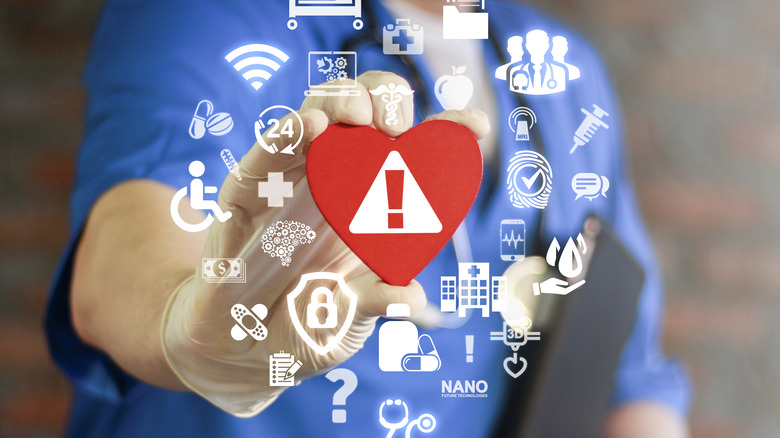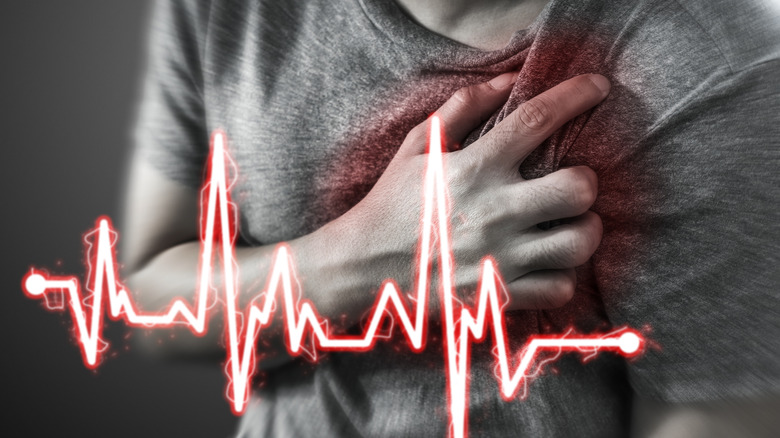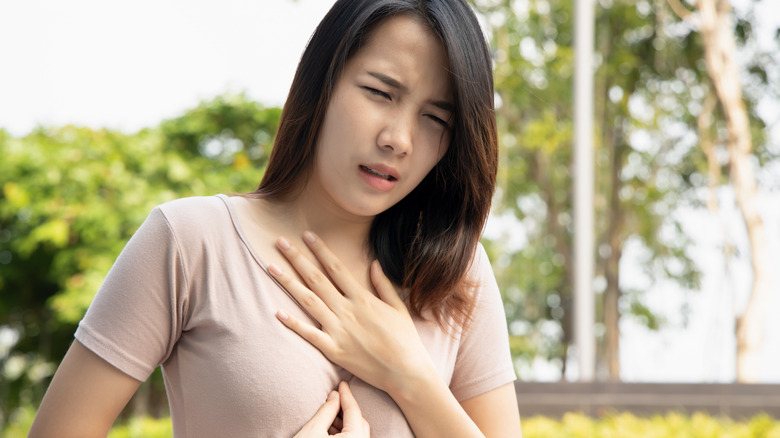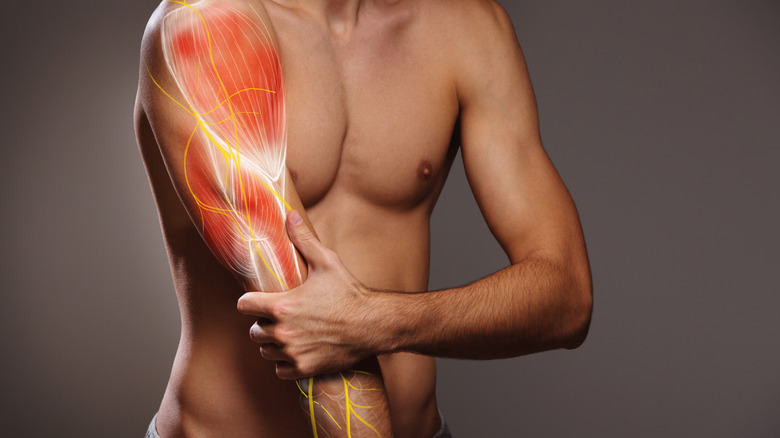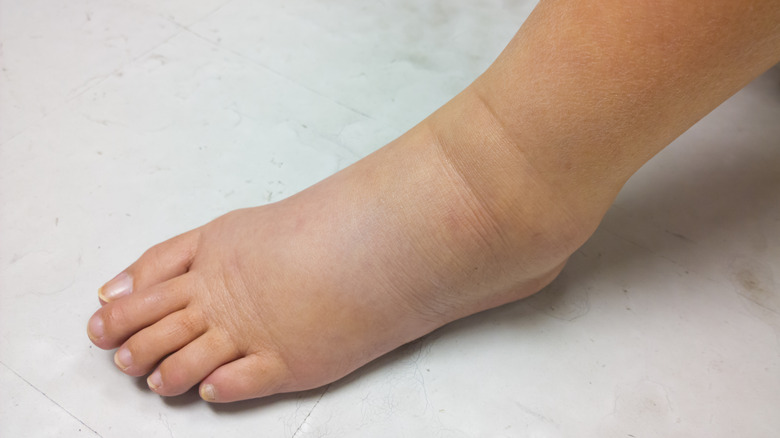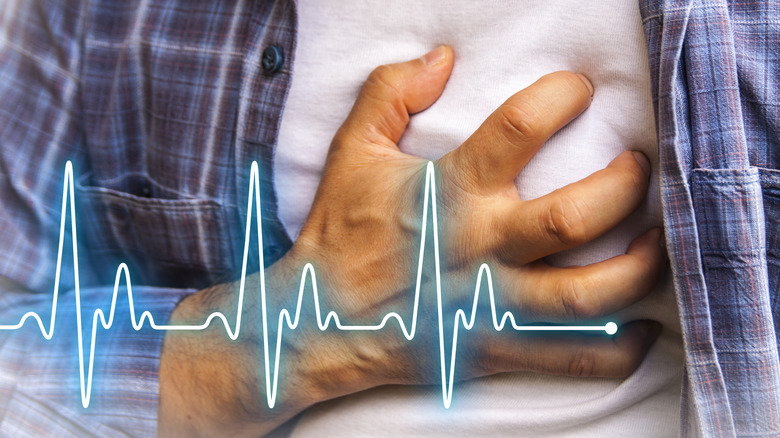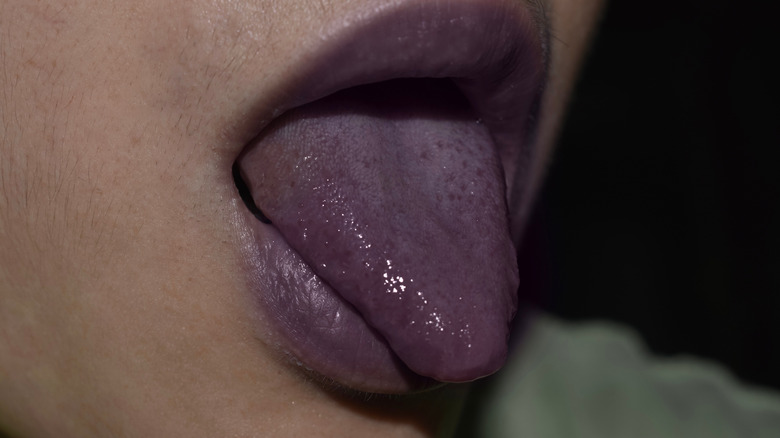Warning Signs From Your Heart You Shouldn't Ignore
Each time your heart beats, blood gets pumped into your lungs and into your arteries, distributing vital oxygen and nutrients to the body. However, complications can occur within the heart's two parts, four valves, and its electrical system (via Mayo Clinic).
Referred to as cardiovascular or heart disease, these issues are the leading cause of death worldwide and affect nearly half of all adults in the U.S. Heart problems range from issues with the rhythm, disease of the valves, narrowed vessels, and complications within the outer lining to trouble contracting and relaxing (via Cleveland Clinic). Causes depend on the type of cardiovascular disease you have, and may be compounded by factors including age and family history. Additional health issues, including diabetes and high cholesterol, also increase your risk of developing heart disease. Smoking, not eating right or exercising, and a stressful environment also boost your heart's chances of disease (via Mayo Clinic).
While not everyone experiences symptoms of heart problems, don't ignore these issues, as they may indicate or develop into a severe problem, especially if disregarded.
Chest pain
Your chest is made up of many organs and tissues, each of which can cause you discomfort. These include your heart, lungs, ribs, and nerves (via Mount Sinai). You could also have back, neck, or stomach pain that radiates to feel as if it's coming from your chest.
The most common cause of chest pain is angina. An indication of coronary artery disease, angina makes you feel as if someone is squeezing your chest, according to the American Heart Association (AHA). Other potential causes of chest pain include a blocked or torn lung artery, an infection, a constricted valve, and inflammation. Non-heart-related causes of chest pain include panic attacks and gastroesophageal reflux disease (GERD).
Chest pain should never be disregarded, even if you are 100% sure of its source. Seek immediate medical attention if the pain is sudden, excruciating, or shoots out from your jaw or left arm. Call for an ambulance if you experience breathlessness, dizziness, nausea, or vomiting with chest pain, or if you've previously been diagnosed with heart disease (via Mount Sinai).
Heartburn
Many people use the terms heartburn and indigestion interchangeably. Heartburn results from stomach acid traveling up into your esophagus, causing a sharp, burning feeling in your chest (via Healthline). This is often a symptom of acid reflux, a condition that occurs when the valve separating stomach from your esophagus weakens, allowing materials in the stomach to move back upward (via The University of Texas at Austin). Acid reflux that occurs more than twice a week and isn't relieved with over-the-counter antacids could be gastroesophageal reflux disease, or GERD. The chronic form of acid reflux, GERD can damage your esophagus. When left untreated, up to 20% of those with GERD develop esophageal cancer.
Indigestion, on the other hand, is the feeling that occurs when you overeat or eat too quickly (via MedlinePlus). As a result, you feel overly full, sometimes to the point of wanting to vomit. Pain can accompany these feelings, which is why so many mistake it for heartburn. Heartburn got its name because it's felt in the chest (via Healthline). Indigestion occurs in the abdomen. You can experience both at the same time.
Though not directly related to your heart, the symptoms of these conditions are often mistaken for a heart attack (via Healthline). Or the reverse can occur: Sometimes those having a heart attack think they're having an episode of heartburn, indigestion, or acid reflux, and don't get the help they need. It's best to err on the side of caution and head to the nearest emergency room if the pain is severe, especially if you haven't eaten in a few hours, antacids don't lessen the discomfort, the sensation runs through your jaw, back, or arms, or you're sweating and out of breath.
Dizziness
People use the term dizziness to refer to several feelings, including lightheadedness, wooziness, and as if they might faint. The confusion and instability associated with dizziness heighten your chances of falling and injuring yourself (via Cleveland Clinic).
Medical professionals often point to problems in your inner ear as the culprit of dizziness, because that's where your sense of balance originates (via Healthline). The most common culprits are benign paroxysmal positional vertigo (BPPV), Meniere's disease, and ear infections. BPPV is the quick rush of dizziness associated with getting up from a seated or bent-over position. It's caused by the calcium crystals in your inner ear moving out of place and is generally harmless. Meniere's disease is believed to be caused by changes in the fluid in your inner ear. And inflammation from an ear infection can result in issues in communication between your inner ear and your brain.
However, dizziness can also be a symptom of an ongoing heart issue. Some more common heart problems that might cause you to become dizzy include arrhythmia, or changes in heart rhythm, problems with the heart's electrical system, and issues with your heart valves (via NYU Langone Hospitals). Another reason not to ignore dizziness is that it is a possible warning sign of a stroke (via American Heart Association).
Sweating
Your body primarily uses sweat as a way to cool itself down. That is why you sweat more when it's hot, while exercising, or when you have a fever (via Stanford Medicine Health Care). The body also uses sweat to get rid of alcohol after a night of drinking, or as a reaction to some medication, hormones, and stress (via Cleveland Clinic).
Doctors refer to excess sweating as hyperhidrosis. Hyperhidrosis results from an overactive sympathetic nerve (via Johns Hopkins Hospital). While most medical professionals won't diagnose excessive sweating for at least six months after the onset of symptoms, it's essential to rule out other medical reasons for this condition (via Cleveland Clinic). This is because sweating without activity could indicate that your arteries are clogged — when this happens, your heart needs to exert more energy to pump blood through your body, causing you to sweat (via Healthline). Indeed, women who experience severe night sweats shouldn't chalk it up to menopause, as sheets soaked in sweat, or the inability to sleep due to extreme sweating, are common heart attack symptoms in women (via Healthline). Other health concerns that cause excessive sweating include diabetes, anxiety, and overactive thyroid (via Stanford Health Care).
Arm pain
Everyday activities including playing sports, using tools, and writing can cause irritation and inflammation in your arm, neck, or upper spine (via Everyday Health). Rest, ice, compression, and elevation can help to relieve these symptoms (via Mayo Clinic). However, seek immediate medical care if the bones are sticking out, you cannot move your arm, or the pain is extreme (via Healthline).
Another reason to see a doctor promptly is if the pain isn't your only symptom, and if the pain is occurring in your left arm. It could be a symptom of anxiety, angina, or a heart attack (via Healthline). Arm pain associated with anxiety is typically minor — though further anxiety about the pain itself might then compound the discomfort. The reduced blood flow to your heart is the cause of arm pain associated with angina. Stable angina occurs during strenuous activity and often goes away on its own. Unstable angina is a sign of a heart attack and usually happens without warning or exertion and doesn't go away on its own (via Baptist Health Care).
Unusual, severe arm pain accompanied by chest pain and tightness indicates a heart attack or other cardiac event (via Healthgrades). Seek immediate medical attention, especially if the pain quickly intensifies and you feel nauseous and lightheaded, and break out in a cold sweat (via Healthline).
Jaw pain
Americans lose over 15 million working days annually due to mouth and jaw pain (via Iranian Endodontic Journal). Jaw pain stems from a variety of different causes. One of the most common is cavities, as upwards of 25% of adults have at least one decayed tooth in their mouth according to the Centers for Disease Control and Prevention (CDC). The pain from your tooth could be so severe that it feels like it's coming from your jaw, especially if you've left it untreated and it becomes infected with an abscess (via Mayo Clinic). Another common cause of jaw pain is a Temporomandibular joint and muscle disorder, or TMD (via Healthline). TMDs can result from injury, arthritis, and overuse due to teeth grinding.
While it may seem like you need to see a dentist for your jaw pain, other causes might not actually involve the mouth at all. For example, headache and sinus pain can also radiate to feel like jaw pain (via Healthline). And a more serious cause for concern regarding jaw pain is that you may be having a heart attack. Chest pain from a heart attack often radiates to other parts of your body, including your jaw — and in fact, during a heart attack you might even feel the pain entirely in your jaw and not in your chest, though this is more frequently seen in women than in men (via Healthgrades).
Exhaustion
Exhaustion is not just feeling tired. It is feeling so drained that you cannot get through your everyday activities, and resting does little to help (via Cleveland Clinic). Lack of rest, too much rest, aging, binge drinking, and some medications are common culprits (via the Medical University of South Carolina).
See a medical professional if extreme weariness comes on suddenly for no reason or lasts more than a week or two. Numerous diseases and disorders cause exhaustion, including anemia, sleep apnea, diabetes, and hypothyroidism (via Sterling Heart Care). But one of the most concerning causes of exhaustion is heart disease. Plaque buildup in your arteries, a significant cause of heart disease, causes these pathways to narrow. And the narrower they are, the harder your heart has to work to pump blood throughout your body. The longer you let symptoms like exhaustion continue, the more plaque will build up, and the more tired you will feel doing ordinary activities (via University of California San Francisco). Call your doctor immediately if your exhaustion is accompanied by weight loss, heart palpitations, chest pain, irregular heartbeat, nausea, or muscle weakness (via Cleveland Clinic).
Loud snoring
Often a symptom of sleep apnea, loud snoring is more than just aggravating: It can adversely affect your health. Sleep apnea is caused by an airway that becomes compressed while you're sleeping, often due to excess weight in the neck and chest (via the AHA). Each time your breathing is obstructed, your oxygen levels plunge, and your body releases the stress hormones cortisone and adrenaline (via Michigan Health). The increase in these hormone levels boosts your risk of having a stroke or developing high blood pressure, type 2 diabetes, and liver problems (via AHA). These hormones also contribute to heart irregularities, worsen heart failure, and cause heart attacks and sudden death. The oxygen reduction can also damage your heart (via Michigan Medicine).
While not everyone that snores has sleep apnea, the condition affects 20% of the population. Sleep apnea is more prevalent in men, and can cause the affected person to awaken due to unexpectedly choking (via AHA). This arousal makes sleep less restful, leading to daytime drowsiness and focus difficulty (via Michigan Medicine).
Swelling
One way your body reacts to injury or illness is through fluid buildup, which causes the affected body part to increase in size (via Mercy Health). When tissue swells, it's called edema. Edema is classified based on looks and where in the body it occurs. Pitting edema is when a dent remains after pressing on the area; with non-pitting edema, there are no such dent (via Medline Plus). If your hands or legs are swollen, it's called peripheral edema. Pulmonary edema is a fluid buildup in your lungs (via Healthline).
Mild swelling is common If you stand for long periods or walk a considerable distance (via Medline Plus). It becomes a medical issue when it becomes painful or is coupled with shortness of breath, fatigue, and abnormal heartbeat (via Healthline). And if your entire body is swollen, either your heart isn't adequately pumping blood through your body — causing a backup — or you have a faulty heart valve that is increasing pressure and forcing fluid retention. Edema can be an early symptom of heart failure, so it's vital to make an appointment with your doctor if you experience swelling for no apparent reason.
Coughing
Coughing is a spontaneous reflux designed to guard your lungs and airway from irritants, including germs, dust, and excess mucous, according to the American Lung Association (ALA). They are classified by productivity and duration. Productive coughs produce a liquid and usually accompany other illnesses, including pneumonia, bronchitis, and the flu. See a doctor if you cough up blood, or the mucus is green or yellow. Nonproductive coughs are dry (via Healthline).
Acute coughs only last a few weeks and usually clear up on their own. Medical attention isn't needed unless your cough is accompanied by whooping, wheezing, or barking, or additional symptoms including a fever, headache, or breathlessness (via ALA). In contrast, a chronic cough will last for weeks or sometimes even years (via Harvard Health Publishing). Asthma, chronic obstructive pulmonary disease (COPD), GERD, and the use of certain medications are among the most common causes of chronic coughing. However, if medication fails to improve your condition and lessen your cough, you should be evaluated for heart failure (via Cleveland Clinic).
Heart palpitations
Your heart thumps 60-100 times a minute to keep blood circulating in your body (via Penn Medicine). You may notice your heartbeat when the rhythm changes to racing, skipping, pounding, or fluttering (via NHS). There's no need to worry if your heart palpitations occur during exercise or strenuous physical activity. The same is true if you drink an energy drink, an extra cup of coffee, or an alcoholic beverage. Additionally, temporarily stressful situations like being called into your boss's office or narrowly avoiding your ex on the street can cause your heart to flutter (via Healthline).
Have your heart palpitations checked by your physician if they persist and last longer than a few seconds, if you have a history of heart disease, or if your symptoms worsen. Head to the nearest emergency room if your heart palpitations are accompanied by chest pain, breathlessness, dizziness, or fainting (via Mayo Clinic). Your doctor will test you for arrhythmia or heart rhythm problems. The most common arrhythmia is atrial fibrillation, which is when your heart beats faster than it usually does. This type of heart palpitation makes you five times more likely to have a stroke than someone with a regular heartbeat (via NHS). Age, obesity, alcoholism, heart disease, and severe Covid-19 increase the likelihood of arrhythmia.
Breathlessness
Breathlessness is the perception of laborious breathing. You can't catch your breath and feel like insufficient air is getting into your lungs. Breathlessness is common during times of physical exertion. However, panic can set in and cause your breathing to become even more arduous (via British Heart Foundation).
When not caused by exercise, breathlessness is most often brought on by heart or lung conditions, as these organs are responsible for moving oxygen around your body (via Mayo Clinic). Angina, heart attacks, heart failure, and atrial fibrillation cause breathlessness because your body feels like it's not getting enough oxygen. Additionally, fluid can build up in your lungs if your heart isn't working correctly, making breathing difficult. Lung issues, including asthma, COPD, blood clots, and pneumonia, cause breathlessness (via American Lung Association).
A study published in the New England Journal of Medicine found that those with shortness of breath were four times more likely to die from heart disease than those with no symptoms (via Cedars Sinai). In addition, being short of breath doubles your likelihood of dying over presenting with just chest pain. "Patients often do not interpret shortness of breath as a serious symptom, but particularly in patients who have cardiac risk factors and in patients without lung disease, it may be the only sign of the presence of serious coronary artery disease that may need treatment," said Dr. Daniel Berman, senior author of the study and the Director of Cardiac Imaging at Cedars-Sinai.
Slow heartbeat
While you're awake, your heart should beat at least 60 times per minute. Anything less than that is considered bradycardia, or an abnormally slow heart rate (via the AHA). Due to this slowdown, your heart isn't pumping blood fast enough, and your body isn't getting the oxygen it needs. As a result, many people with slow heartbeats feel weak, tired, and confused. In addition, those with slow heartbeats tend to feel dizzy to the point of fainting (via Cedars Sinai).
Heart blockages and sinus node issues are the most common causes of a slow heartbeat. In a heart blockage, the pathways that carry the electrical signals from one chamber to another aren't working correctly (via Mayo Clinic). Sinus node problems also involve electrical signals in the body. The sinus node has nothing to do with your nose. Instead, it is the group of cells whose job is to keep your heart pumping. The electric impulses it sends slow down when it's not functioning optimally, causing your heart rate to decrease (via Cedars-Sinai). If you have bradycardia that is left untreated, you could end up fainting and developing heart failure and blood pressure issues. Chest pain also results from an untreated slow heartbeat (via AHA).
Skin color changes
Skin, particularly around your nails and mucous membranes including your lips, gums, and eyes, is called cyanosis (via Mount Sinai). This skin discoloration is due to inadequate oxygen levels in your blood, which can be caused by a few different factors (via Healthline). Oxygen levels in your blood can decrease due to congenital heart defects that change how blood flows through your heart and lungs (via Penn Medicine). Blood clots, lung infections including bronchitis, asthma, and cardiac arrest can also cause your skin to change color and look bluish (via Mount Sinai).
Cyanosis — the technical term for when your skin takes on a bluish hue — is classified by cause and location (via Healthline). Peripheral cyanosis refers to low blood flow or injury that causes limited oxygen to reach your extremities. Central cyanosis occurs when you have abnormal blood proteins and low oxygen throughout your body. Your doctor diagnoses you with mixed cyanosis if you have both peripheral and central. Acrocyanosis is when your hands and feet turn bluish when they get cold.
While not a medical emergency in and of itself, cyanosis often indicates a more severe issue that needs medical attention. Call 911 if you experience breathlessness, confusion, or chest pain along with skin color changes (via MedlinePlus).
